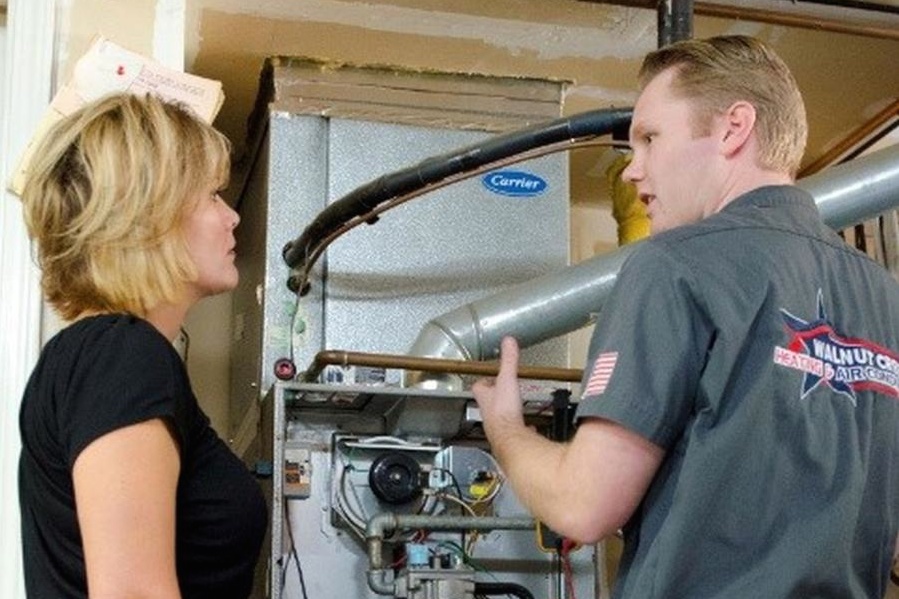5 Things to Ask an HVAC Installer

Prior to hiring a company to install your new heating or cooling unit, be sure to ask plenty of questions. Photo: Hometown Heating & Air Conditioning ©2018
Before hiring a company to install your new furnace or air conditioner, there are several things you’ll need to inquire about, from licensing and insurance to scheduling and payment. However, there are a few questions many homeowners don’t think to ask, but should. Here are five things to ask an HVAC installer:
1. What’s included in your estimate?
When reading an HVAC installer’s estimate, make sure it addresses the big picture. In other words, it should take into account all aspects related to your home HVAC system, not just the unit itself. Since the heating or cooling unit is merely part of the larger whole, failure to address other important system aspects (such as ductwork) can result in subpar performance following installation.
The estimate should also present viable alternative options to replacement, like repairing the existing unit. Additionally, it should highlight potential safety concerns, such as the presence of asbestos. Ask the installer to go over the estimate with you in detail and account for any missing information.
2. How will you ensure the unit is correctly sized for my home?
When replacing your furnace or air conditioner, it’s critical for the incoming unit to be correctly sized, both to your home and your HVAC system’s existing components. When an HVAC unit isn’t sized properly, it can lead to all sorts of problems. One common symptom is “short cycling,” which is when a unit continually turns on and off in an attempt to regulate the constantly fluctuating temperature. This not only detracts from in-home comfort, it lowers the unit’s energy efficiency and shortens its operating lifespan.
To ensure a new furnace or air conditioner is properly sized, an HVAC installer needs to calculate the heating and/or cooling loads for the home. To do this, they’ll first measure each room in the home and record a variety of data, including the R-values of insulation and windows, the home’s orientation in relation to the sun, air leakage, and ductwork airflow. They’ll then use a Manual J calculator (a sophisticated load calculation software program) to determine what type of unit will provide the appropriate amount of heating and/or cooling for the home.
Unfortunately, not all HVAC installers take the time to properly size units before installing, so it’s important to bring up this subject during the interview. Ask the installer to explain the method they’ll use to size your new unit. If they aren’t able to provide a detailed explanation, you should probably hire someone else.
3. Will my new unit qualify for any rebates?
An additional benefit of replacing your furnace or air conditioner is the opportunity to take advantage of rebate programs. Right now, there are several programs available to California homeowners who want to make energy-efficient upgrades to their homes, which can help offset the cost of equipment and installation. For example, by utilizing the Energy Upgrade California® Home Upgrade Program, qualifying homeowners receive an average rebate of $2,300, which can cover approximately 15 percent of project costs.
Ask the installer if your HVAC installation will qualify for a rebate program. If not, ask if another, more energy-efficient unit would and if that might be a better option. Consider purchasing a unit that has an Energy Star label, which means it has passed the high efficiency standards established by the EPA and the U.S. Department of Energy.
4. What can I do to maximize energy savings once my new unit is installed?
Even if you buy the most energy-efficient heating or cooling unit available, if you don’t address other aspects related to home energy efficiency, you may not see much of a return on your investment. Leaky windows, poor insulation, and deteriorated ductwork all detract from HVAC system performance and can offset any anticipated energy efficiency gains. Ask your HVAC installer to assess these aspects of your home and make recommendations for how they can be improved.
5. What kind of maintenance will my new unit require?
Most HVAC companies recommend having your heating and air conditioning equipment checked at least once a year. Some suggest two annual appointments: one in the fall to service your furnace and one in the spring to service your air conditioner. Regular service can save you money by keeping your unit running at peak performance and addressing problems before they cause a system failure. Additionally, most heating and cooling unit warranties mandate ongoing maintenance as part of their warranty terms. Ask if your HVAC installer offers a maintenance plan—if not, you’ll need to find another company that does.
Use Diamond Certified Resource to find top rated companies.
Local, Top Rated Diamond Certified Companies Related to Your Topic
San Francisco HVAC Contractors
Santa Clara County HVAC Contractors
Contra Costa County HVAC Contractors
Sonoma County HVAC Contractors
San Mateo County HVAC Contractors
Related Articles
The Homeowner's Guide to Heating, Cooling & Air Quality
Get Expert Advice From Owners of Top Rated Local Companies
Become a Diamond Certified Preferred Member (Always Free)